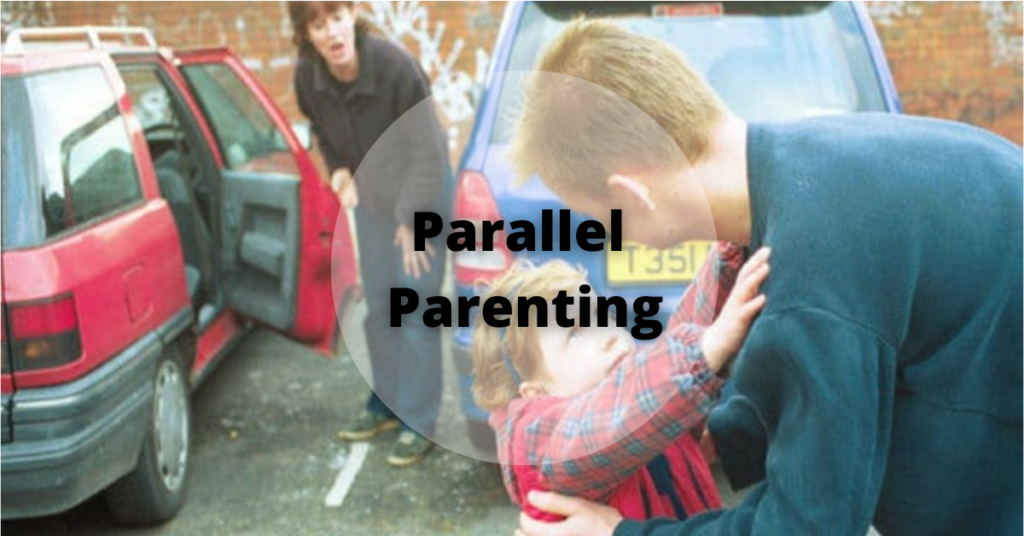Parenting is one of the hardest jobs in the world, but it doesn’t have to be. There are many different parenting styles out there, and they all work–some just better than others! Parallel parenting is a style that can help parents by dividing up their roles with respect for each other’s strengths. This blog post will cover what parallel parenting is and how it works so you can decide if this method could benefit your family!
Contents
What is Parallel Parenting?
 Parallel parenting is a co-parenting arrangement where the children spend half of their time with each parent. This can happen in two different ways. Each parent may have physical custody and alternate weeks or every other week, or both parents share physical custody and all kids live together as one family unit during holidays and long weekends.
Parallel parenting is a co-parenting arrangement where the children spend half of their time with each parent. This can happen in two different ways. Each parent may have physical custody and alternate weeks or every other week, or both parents share physical custody and all kids live together as one family unit during holidays and long weekends.
This parenting style is beneficial for children. This is because it allows them to have a strong relationship with both parents. It can also help reduce conflict between the parents as they are no longer in direct competition for time with the kids.
Types of Parallel Parenting
There are two different types of parallel parenting: split custody and shared custody.
Split Custody
 Split custody is when each parent has physical custody of some of the children. For example, mom might have custody of the kids on Monday, Wednesday, and Friday while dad has them on Tuesday, Thursday, and Saturday. This parenting style can be difficult for the children because they may feel like they are being pulled in different directions.
Split custody is when each parent has physical custody of some of the children. For example, mom might have custody of the kids on Monday, Wednesday, and Friday while dad has them on Tuesday, Thursday, and Saturday. This parenting style can be difficult for the children because they may feel like they are being pulled in different directions.
This style is often used when there are too many children for one parent to have custody of them all, or when the parents live far apart from each other.
 Shared custody is when both parents share physical custody of the children and they all live together as one family unit during holidays and long weekends. This parenting style can be difficult for the parents. This is because they need to cooperate with each other in order to make it work. However, it is beneficial for the children because they get to spend time with both parents equally.
Shared custody is when both parents share physical custody of the children and they all live together as one family unit during holidays and long weekends. This parenting style can be difficult for the parents. This is because they need to cooperate with each other in order to make it work. However, it is beneficial for the children because they get to spend time with both parents equally.
Parents can choose this type of parallel parenting who live close to each other.
How Does Parallel Parenting Work?

In both types of parallel parenting, the parents can share custody in one of two ways: alternating weeks or every other week.
Alternating Weeks
This is a type of shared physical custody. It is where each parent has the children for a full week before handing them over to the next parent for their week with them. For example, mom might have the kids from Sunday until Tuesday while dad has them from Wednesday until Friday and then they switch on Saturday and Sunday so that everyone gets two weekends per month with their kids. This style works best when there are four days between handovers because it gives enough time for any changes to be made such as doctor’s appointments or school events without disrupting too much family time together. Alternating weeks also allows the children to have a set schedule that they can rely on.
Every Other Week
This is a type of split custody. It is where each parent has the children for two consecutive weeks before handing them over to the next parent. For example, mom might have the kids from Monday until Thursday while dad has them from Friday until Sunday and then they switch on Monday so that everyone gets one weekend per month with their kids. This style works best when there are seven days between handovers because it gives enough time for any changes to be made such as doctor’s appointments or school events without disrupting too much family time together. Every other week also allows the children to have a set schedule that they can rely on.
Parallel Parenting v\s Co-Parenting

In the world of parenting, there are two popular methods that parents often choose from- parallel parenting and co-parenting. But what is the difference between these two methods? And which one is right for you?
Parallel Parenting: In this method, both parents remain completely independent of each other. They have no contact with each other whatsoever and they share no responsibilities when it comes to their child/children. This can be a good option if the parents are unable to get along or if there has been any kind of abuse in the past. It can also be helpful if one parent lives far away from the child’s home. However, it can be difficult for the child if they feel like they are being pulled in two different directions by their parents.
Co-Parenting: In this method, the two parents work together to raise their child/children. They share responsibilities and make decisions together. This can be a good option if the parents are able to get along and want to be involved in their child’s life. However, it can also be difficult if there is a lot of disagreement between the parents. It is important that both parents are able to put their differences aside for the sake of their children.
So which parenting style is right for you? It really depends on your situation and what works best for you and your family. If you are unable to co-parent effectively, then parallel parenting may be a better option for you. But if you think that you can get along with your ex, then co-parenting may be the way to go.
Benefits of Parallel Parenting

These are some of the benefits of Parallel Parenting:
Helps To Reduce Conflict
Since the parents do not need to compete for time with their children, they are less likely to fight over custody agreements. This also means that it is easier for them to come up with a fair parenting plan together. This is without having any negative feelings towards each other. It is because there isn’t as much pressure on them.
Helps Children Have Strong Relationships
Children who live in parallel parenting situations often have strong relationships with both of their parents. Since they get more time alone with each parent, this helps them feel like an individual and increases their self-esteem. It can also reduce conflict between siblings if one has spent more time at mom’s house while another spends more time at dad’s house. At the end of the day, everyone gets along and works as a family unit.
Allows Parents To Involve Equally
Both parents are able to equally participate in their children’s upbringing which means that they both have an equal say in important decisions such as what activities they take part in or who they can/cannot see. This benefits not only the children but also the parent because it allows them to feel like active participants instead of just ‘visitors’.
Helps Maintain Financial Responsibility For Kids
Since there is more than one person taking care of expenses for things such as clothing, food, schooling fees, etc., these costs do not need to fall solely on one parent. This helps keep both parents financially responsible for their children which is beneficial to the kids as well since they know that mom and dad are actively working together instead of against each other.
Gives Children Stability
Parallel parenting can give children a sense of stability since they know what to expect each week and each month. This is especially beneficial for kids who have gone through a lot of change in their lives. These are such as moving homes or experiencing parents getting divorced. It allows them to feel safe and secure knowing that there is still some consistency in their life no matter what else might be going on.
Side-Effects of Parallel Parenting

There can be some side-effects of Parallel Parenting which include:
Difficulty With Visitation Rights
Since there are always going to be times when one parent is at home and the other isn’t, it can be difficult for parents to agree on a custody arrangement that suits both of their needs. For example, mom might not want dad having his kids every second weekend because she knows he will have them from Friday until Sunday since they have been with him all week. This means that there may need to be some negotiations before they can make a final agreement.
Not Ideal When Parents Live Far Away
If both parents live in different areas or countries, this type of parenting style might make things more complicated as opposed to simpler because they would need to rely on technology (Skype, FaceTime) more in order to stay connected. It can also be expensive to fly back and forth between two homes so this should be taken into consideration before making any decisions. This may not be ideal for some people looking to make Parallel Parenting work.
Difficulty With Joint Decision Making
Since parents are always going to have different opinions on certain things (i.e. what school their child should attend), it can make making decisions together more difficult especially if one parent is completely against the other’s opinion. This means that there may need to be compromises made so both sides feel heard and respected which might mean giving in a little bit when necessary but at least they will know where each stand on an issue before moving forward with anything else since no plans will be agreed upon without everyone being happy about them first.
Difficulty With Scheduling
Since there are two homes, two different sets of rules, and potentially two different parenting styles involved, it can be difficult to schedule things so that everyone is happy. For example, dad might want the kids to come over every other Saturday while mom wants them to come on Sundays instead. This means that they will need to compromise on a day that works for both parents which can be tricky but manageable if both parties are willing to try.
Conclusion
In conclusion, Parallel Parenting can be a great way for children to feel connected to both of their parents no matter what might be going on in their lives. It can also help maintain financial responsibility and give kids a sense of stability. There are some side-effects that need to be taken into consideration before making any decisions but with some negotiation, they should all be able to work out in the end.
For more information, please contact MantraCare. Parenting is a challenging yet rewarding experience that is crucial for the development and well-being of a child. If you have any queries regarding Online Parenting Counseling experienced therapists at MantraCare can help: Book a trial therapy session


